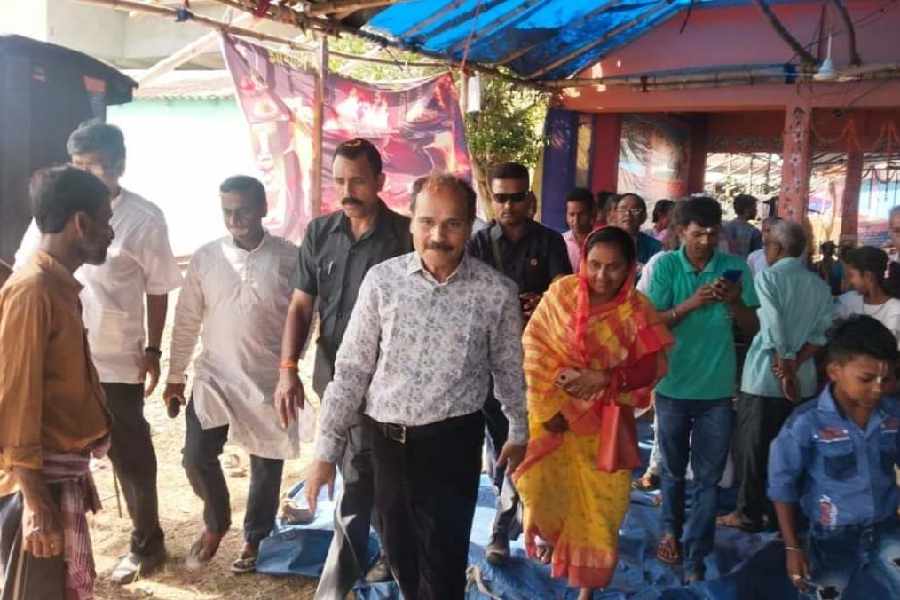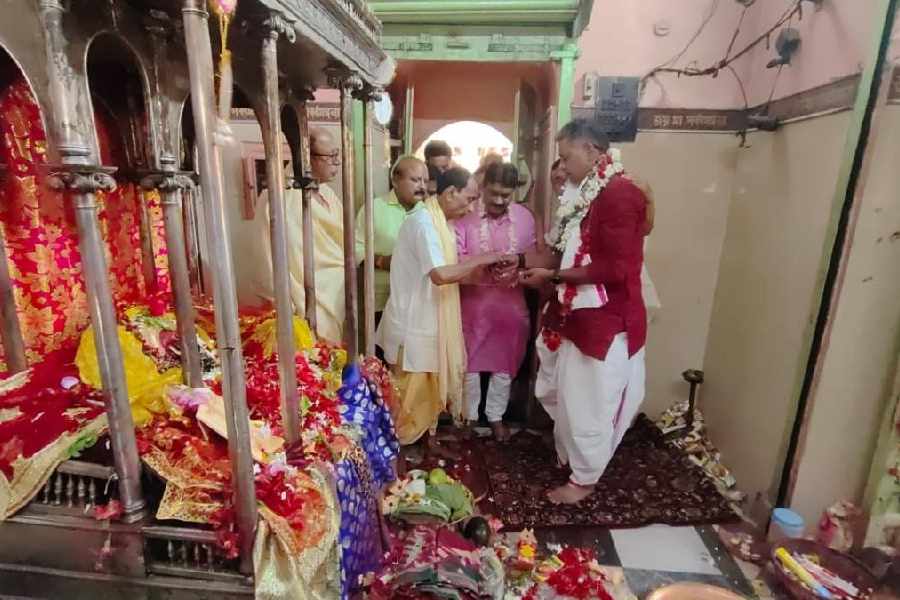The BJP’s Burdwan-Durgapur candidate, Dilip Ghosh, on Wednesday conducted a yajna at his residence, visited a temple, and took part in a colourful roadshow with a damru (a small handheld two-headed drum) in his hand, before filing his nomination papers at the office of East Burdwan district election officer amid much fanfare.
“It is part of our rich culture. I am a devotee of Lord Shiva. That is why many people gifted me different devotional items like a trishul and damru. Today, I kept playing the damru during my nomination rally to highlight our ancient culture,” Ghosh told The Telegraph.
It is not that Ghosh created the devotional environment only on the day of his nominations, he also visited over 50 local temples in various villages where he went for his poll campaigning.
“There are two or three temples in every village in East Burdwan and Durgapur. I tried to visit all those temples during my campaign and met people to connect with them,” he added.
It is not unusual for Ghosh or the other 41 BJP candidates in Bengal to harp on religion, as their party leadership — starting with Prime Minister Narendra Modi — has decided to push the Hindutva agenda, particularly after the consecration of the Ram temple in Ayodhya in January this year.
Surprisingly, the temple-run politics in the Lok Sabha polls is not restricted to the BJP, as all political parties — Trinamool Congress, Congress and the CPM — are out to Hindu voters.
Trinamool's temple push became prominent in the 2021 Assembly polls when most of its candidates visited local temples and worshipped local deities as part of its campaign. Chief minister Mamata Banerjee also visited temples in Nandigram during her campaign. A source said the strategy was prescribed by poll consultant Prashant Kishor and his team I-Pac to counter the BJP’s politics of polarisation.
However, for Trinamool, it was not only temples, the candidates had been paying visits to Muslim shrines in minority pockets.
Satabdi Roy, Trinamool's Birbhum nominee, who filed her nomination papers on Monday, offered puja at a Kali temple in Suri town and later visited a Muslim shrine in Pathar-Chapuri. A close aide to Roy said the visits to local temples or shrines were a must in her campaign schedule.
“It is not only Satabdi, but most of the candidates have been visiting local temples, shrines or popular places beyond religious destinations,” said a source in Trinamool.
Congress’s Behrampore candidate and the party’s state president Adhir Ranjan Chowdhury, who filed his nomination on Wednesday, had visited temples and participated in different religious ceremonies during his campaign.
Political observers said the temple run in Bengal’s electoral politics was not a phenomenon before the 2019 Lok Sabha polls when the BJP won 18 seats.

Congress candidate from Berhampore Adhir Ranjan Chowdhury attending a religious programme in Murshidabad's Burwan last week.
“This time the temple run has crossed all earlier limits. The politics of visiting religious places as part of their campaign was a north Indian phenomenon. With the BJP reaping political dividends from visiting temples, its rivals merely copied it. Now, even the CPM candidates are not leaving a chance to visit a temple,” said political scientist Biswanath Chakraborty.
In keeping with their atheist philosophy, CPM leaders traditionally refrained from visiting religious places. However, in recent times, deviation has been seen.
During this year’s campaign CPM’s Baranagar by-poll nominee Tanmoy Bhattacharya was spotted at a temple inside a housing complex during Ram Navami.
Isn’t this deviation from the party's avowed position of not partaking in religious activities? Bhattacharya said: “No. Don’t mix what they (BJP and TMC) do with what I did.”
“Like every year, I merely responded to an invitation from residents of Vinayak Enclave in Baranagar. I attended a cultural event on the occasion of Ram Navami and when a few residents requested me, I visited their temple inside the complex.... Being an atheist, I do not partake in any religious event and there was no question of offering prayers or standing with folded hands before the deity.”











